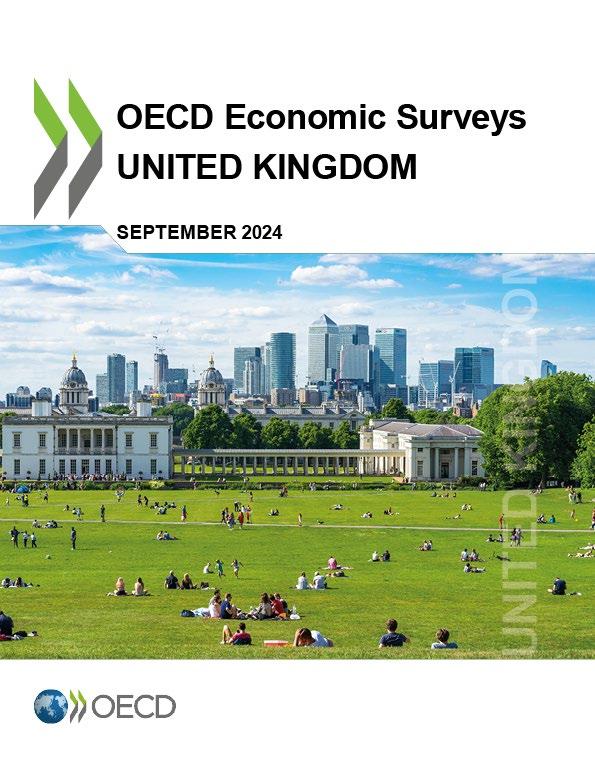UNITED KINGDOM
Improving fiscal and structural policies to support growth

11 September 2024


oe.cd/GBR




Improving fiscal and structural policies to support growth

11 September 2024


oe.cd/GBR



Real gross domestic product Index, 2019Q4 = 100
Note: G7* refers to the G7 average excluding the United Kingdom. Flash estimate for 2024Q2.
Source: OECD Main Economic Indicators (database).


Source: OECD Economic Outlook: Database and Projections.



Source: OECD Main Economic Indicators (database).

Current fiscal policies
Indexation of pensions to an average of CPI and wage inflation
Selected tax and supply side reforms to boost labour and investment
Note: The Baseline scenario assumes current fiscal policies, average GDP growth of about 1.6% over the simulation horizon, and a deterioration in the primary balance from not offsetting health and longterm and pension-related spending; the Triple Lock Reform scenario assumes an improvement in the primary balance compared to the Baseline scenario due to savings from indexing pensions to an average of CPI and wage inflation; the Selected Tax Reforms scenario assumes a gradual improvement in the primary balance over a 5-year horizon from improved tax compliance and unfreezing the fuel duty; the Selected Tax and Structural Reforms scenario further assumes a gradual 0.5% increase in labour supply over a 5-year horizon and a gradual increase in productivity enhancing investment to G7 average.
Source: Simulations based on the OECD Economics Department Long-Term Model.

Difference between tax collected and the total amount of tax that should be collected % of GDP
Note: Years refer to fiscal years, lasting from April in the given year to March in the following year. the The tax gap estimates, measuring the difference between tax collected and the total amount of tax that should, in theory, be collected if individuals and businesses paid all due tax, only cover the taxes administered by HMRC, so they exclude any taxes and duties administered elsewhere, such as council tax, business rates and vehicle excise duty, as well as charges such as the congestion charge.
Source: Office for Budget Responsibility.




Note: G7* is the simple average of G7 countries without the United Kingdom
Source: OECD Productivity statistics.


Source: Institute for Fiscal Studies 2024.



Note: G7* refers to the G7 average excluding the United Kingdom.
Source: OECD Labour Force Survey (database).

Source: Office for National Statistics.
Cumulative change in inactive population
Thousands of 16-64-year-olds

Inactive population, by reason and gender, 2023
Thousands of 16-64-year-olds
Source: OECD Social and Welfare Statistics (database); Office for National Statistics.
Net childcare cost, 2022 % of average wage



Note: Data for 2023 are preliminary.
Source: OECD (2024), Environment database; ONS, Climate Change Committee (2023), 2023 Progress report to Parliament.

Note: Selected sectors only. Sectors not depicted include transport, agriculture, land use and forestry, international aviation and shipping, and fuel supply.
Source: OECD (2024), Environment database; ONS, Climate Change Committee (2023), 2023 Progress report to Parliament.

Note: ETS = Emissions Trading System.

Score from 1 (least energy efficient) to 100 (most energy efficient), England, 2013-2021
Note: The Energy efficiency of a property is rated from A (very efficient) to G (very inefficient), based on a score between 1-100. Band A refers to a score of 92-100; Band B: 81-91; Band C: 69-80; Band D: 55-68; Band E-G: 1-54.
and Not

- Gradual fiscal consolidation is needed to support the return of inflation to target and rebuild fiscal space.
- Reducing tax exemptions would reduce distortions and support revenues.
A long-term strategy, including for the corporate tax system, can provide businesses with the certainty needed to make investment decisions.
Stronger work incentives within health-related welfare, stepped up childcare support, and more adequate skills are necessary to reduce inactivity.
A clear long-term strategy, including better pricing signals, regulatory timelines, and financial support to stimulate the clean heating market – are needed to accelerate emissions reductions in residential housing.


Disclaimers:




The statistical data for Israel are supplied by and under the responsibility of the relevant Israeli authorities. The use of such data by the OECD is without prejudice to the status of the Golan Heights, East Jerusalem and Israeli settlements in the West Bank under the terms of international law. This document and any map included herein are without prejudice to the status of or sovereignty over any territory, to the delimitation of international frontiers and boundaries and to the name of any territory, city or area.